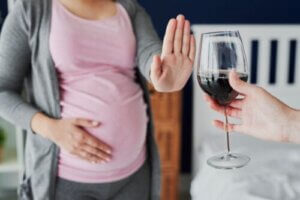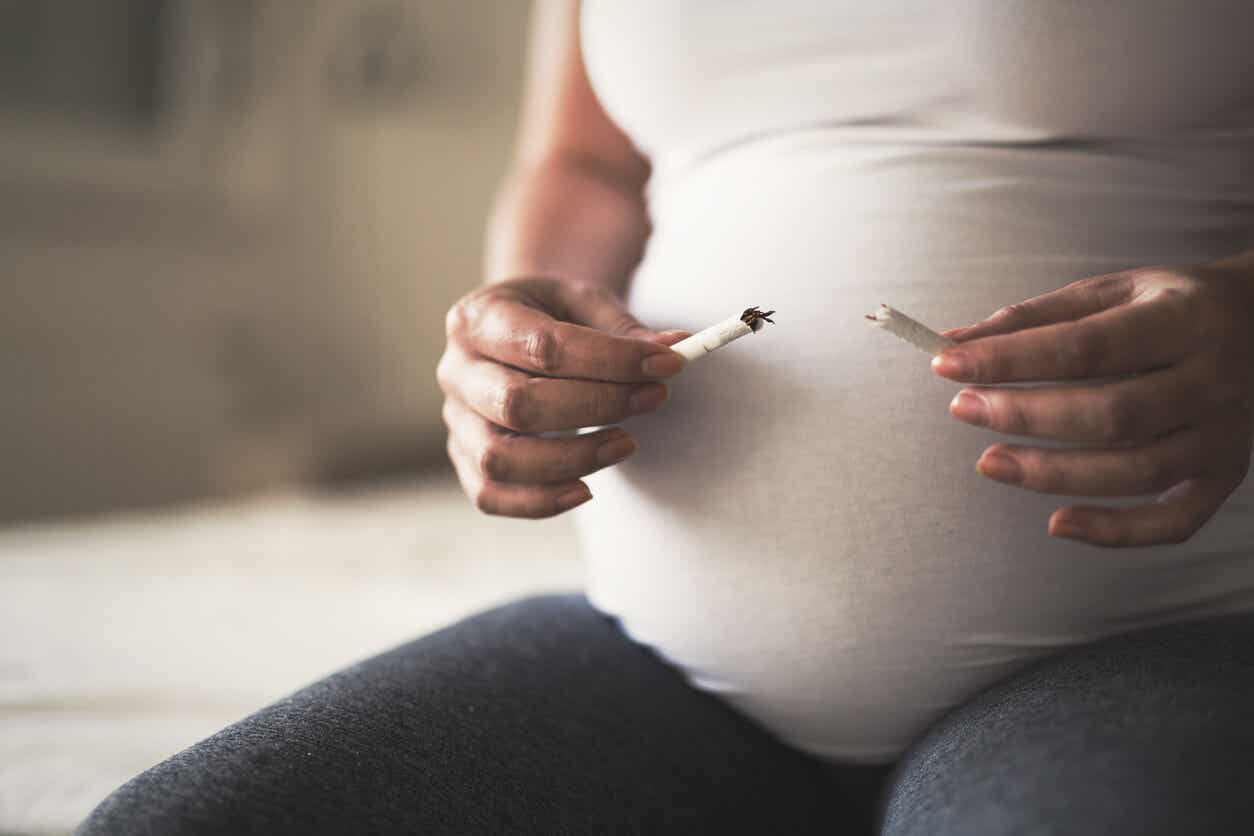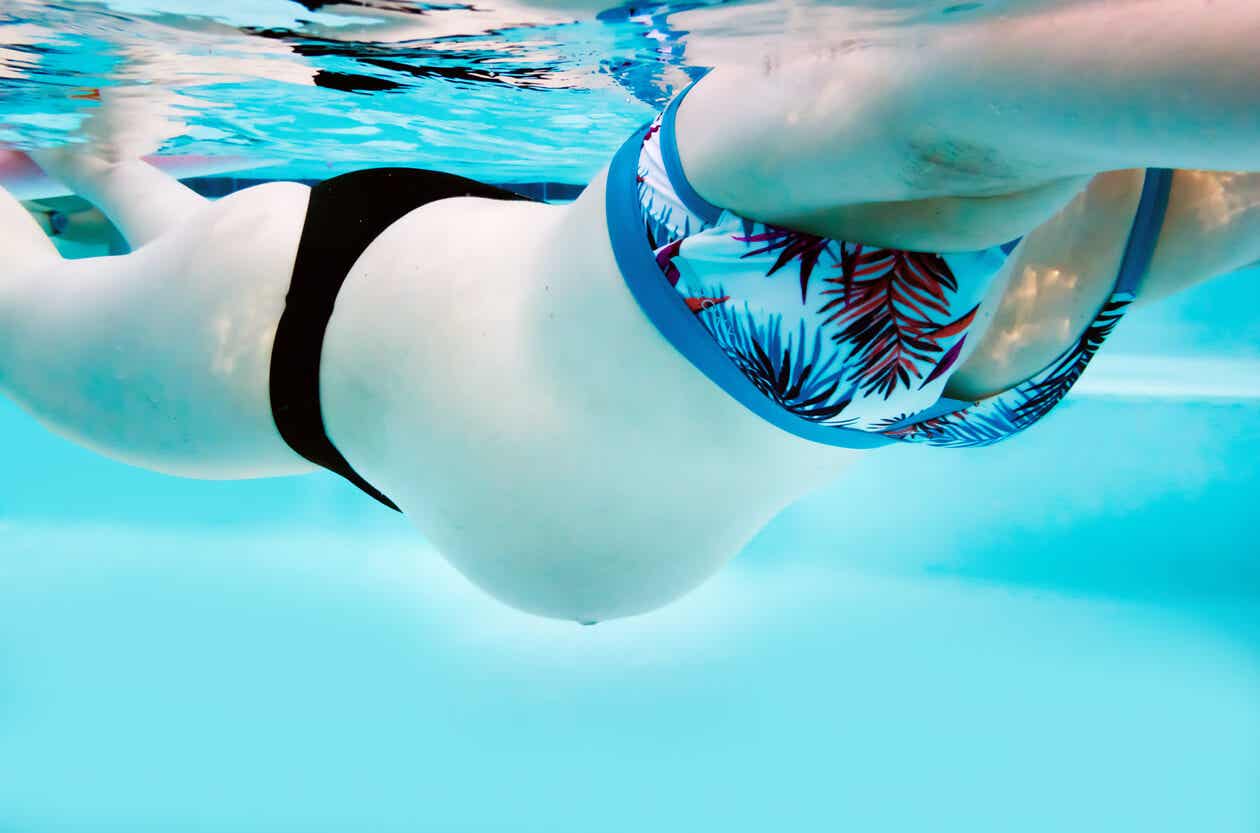7 Things to Avoid During Pregnancy


Written and verified by the nurse Leidy Mora Molina
After learning that you have a baby on the way, many questions will come to your mind, such as what things to avoid during pregnancy for the sake of your and your baby’s health.
Certainly, your well-being and that of your child can be compromised if you maintain certain common habits, such as smoking or drinking coffee. This happens because everything you consume directly or indirectly reaches the uterus and passes into the baby’s blood through the placenta.
By receiving certain substances, the baby could suffer changes in its body, which are capable of producing complications during gestation or health problems even after birth. In this article, we’ll tell you what they are so that you can start restricting them.
7 things to avoid during pregnancy
Having a healthy pregnancy isn’t difficult. You just have to pay attention to what you consume and the activities you perform during pregnancy. Here are some of the things you should stop doing right now.
1. Smoking
Smoking is one of the habits that has the most negative consequences for the health of the pregnant woman and her baby. Despite this, around 50% of pregnant women continue to smoke at this stage.
According to the American Thoracic Society, by smoking, the mother passes to the fetus more than 7,000 toxic and carcinogenic substances present in cigarettes. This also increases the risk of suffering pregnancy problems such as the following:
- Alterations in the placenta
- Ectopic pregnancies
- Fetal mortality
- Premature births

In this sense, the fetus’s lack of oxygen caused by nicotine could affect its neuronal development, the formation of its organs, and the growth inside the uterus.
In addition to this, research has shown that babies born to mothers who smoke have a higher risk of presenting certain problems, such as these:
- Low birth weight
- Nicotine withdrawal syndrome
- Sudden infant death syndrome
- Asthma
- Childhood obesity
If the pregnant woman quits smoking in the first trimester, the risk of suffering any of these complications decreases substantially, becoming equal to that of a non-smoking mother.
2. Drinking alcohol
Another substance that you should avoid during pregnancy is alcohol. Alcohol passes quickly into the mother’s bloodstream after she ingests it and reaches the baby through the placenta and the umbilical cord. The immaturity of the fetal liver doesn’t allow its correct elimination from the body, thus causing toxicity in all the baby’s organs.
Experts have yet to determine how much alcohol is dangerous for your child, as there have been reports of cases in which just one glass of wine was enough to cause damage to a baby’s body such as Fetal Alcohol Spectrum Disorder (FASD).
You should know that after one hour of having consumed alcohol, you and your baby will have the same concentration of this substance in your blood.
3. Coffee and pregnancy
Coffee isn’t a totally forbidden drink during pregnancy, but it should be consumed in moderation. A high caffeine intake, especially during the first trimester, increases the chances of miscarriage or low birth weight.
The College of Obstetricians and Gynecologists (ACOG) recommends limiting caffeine intake to 200 mg per day, that is, 1 cup of coffee of 12 ounces.
The WHO, on the other hand, suggests ingesting up to 300 mg or 2 cups of caffeine per day during pregnancy. This amount includes coffee, chocolate, teas, and cola containing caffeine.
It’s important to know that coffee consumption during pregnancy can accentuate certain common discomforts of this stage, such as heartburn and insomnia.
4. Strict diets
A balanced diet is crucial to maintaining good health during pregnancy. This is a stage where the demand for calories and nutrients increases to meet the needs of the mother and the growing baby.
For this reason, you should avoid strict diets during pregnancy. The lack of micro and macronutrients can predispose the baby to suffer neural tube defects (such as spina bifida), low birth weight, congenital malformations, miscarriages, and premature birth.
In general, a pregnant woman needs to consume approximately 2,500 calories per day, which she’ll ideally get from a nutrient-balanced diet. If possible, a nutrition specialist should prescribe the right diet.
5. Going to a spa or sauna
Many women are used to going to spas or saunas to relax, but some of these things should be limited during pregnancy.
Saunas handle high temperatures (close to 190ºF), which can increase the pregnant woman’s body temperature to over 102ºF. Temperatures above 101°F in the first trimester of pregnancy may cause congenital anomalies in the baby.
Therefore, it’s better to avoid going to places with high temperatures pregnancy, such as saunas, hot tubs, or bathtubs. You should also avoid exercising in similar conditions. For example, under the sun’s rays in summer or in poorly ventilated gyms.
It’s important that, before engaging in any of these activities, you discuss them with your doctor.
6. Intense exercise and pregnancy
Pregnant women should be cautious with the physical activity they perform, avoiding those activities that require a large expenditure of energy or require sudden movements, such as intense exercise.
High-impact activities, such as weight lifting, shaking, bouncing, and jumping, aren’t recommended. The pressure inside the abdomen and the muscular effort that these exercises cause could increase the risk of miscarriages and premature deliveries.
In contrast, gentler exercises such as walking, swimming, or prenatal yoga are highly beneficial for the health of the pregnant woman and prevent complications such as preeclampsia and gestational diabetes.

7. Not taking care of yourself emotionally
Pregnancy’s a period of many emotions that are constantly changing and where maternal hormones are the order of the day. The discomforts of this stage, the uncertainty surrounding childbirth, and the fear of the new role that lies ahead, can cause anxiety and maternal stress.
Stress increases the hormone cortisol, which has a direct impact on fetal well-being, also increasing the risk of miscarriage.
Similarly, prepartum stress and anxiety interfere with the release of oxytocin, which is the hormone responsible for stimulating uterine contractions.
The importance of avoiding certain habits during pregnancy
The consequences of certain habits during pregnancy are 100% preventable. Therefore, maintaining a healthy routine during this stage is mandatory.
It’s important that you seek help if you have a hard time giving up smoking or alcohol. The support of your environment and your doctor will be of vital importance during pregnancy.
After learning that you have a baby on the way, many questions will come to your mind, such as what things to avoid during pregnancy for the sake of your and your baby’s health.
Certainly, your well-being and that of your child can be compromised if you maintain certain common habits, such as smoking or drinking coffee. This happens because everything you consume directly or indirectly reaches the uterus and passes into the baby’s blood through the placenta.
By receiving certain substances, the baby could suffer changes in its body, which are capable of producing complications during gestation or health problems even after birth. In this article, we’ll tell you what they are so that you can start restricting them.
7 things to avoid during pregnancy
Having a healthy pregnancy isn’t difficult. You just have to pay attention to what you consume and the activities you perform during pregnancy. Here are some of the things you should stop doing right now.
1. Smoking
Smoking is one of the habits that has the most negative consequences for the health of the pregnant woman and her baby. Despite this, around 50% of pregnant women continue to smoke at this stage.
According to the American Thoracic Society, by smoking, the mother passes to the fetus more than 7,000 toxic and carcinogenic substances present in cigarettes. This also increases the risk of suffering pregnancy problems such as the following:
- Alterations in the placenta
- Ectopic pregnancies
- Fetal mortality
- Premature births

In this sense, the fetus’s lack of oxygen caused by nicotine could affect its neuronal development, the formation of its organs, and the growth inside the uterus.
In addition to this, research has shown that babies born to mothers who smoke have a higher risk of presenting certain problems, such as these:
- Low birth weight
- Nicotine withdrawal syndrome
- Sudden infant death syndrome
- Asthma
- Childhood obesity
If the pregnant woman quits smoking in the first trimester, the risk of suffering any of these complications decreases substantially, becoming equal to that of a non-smoking mother.
2. Drinking alcohol
Another substance that you should avoid during pregnancy is alcohol. Alcohol passes quickly into the mother’s bloodstream after she ingests it and reaches the baby through the placenta and the umbilical cord. The immaturity of the fetal liver doesn’t allow its correct elimination from the body, thus causing toxicity in all the baby’s organs.
Experts have yet to determine how much alcohol is dangerous for your child, as there have been reports of cases in which just one glass of wine was enough to cause damage to a baby’s body such as Fetal Alcohol Spectrum Disorder (FASD).
You should know that after one hour of having consumed alcohol, you and your baby will have the same concentration of this substance in your blood.
3. Coffee and pregnancy
Coffee isn’t a totally forbidden drink during pregnancy, but it should be consumed in moderation. A high caffeine intake, especially during the first trimester, increases the chances of miscarriage or low birth weight.
The College of Obstetricians and Gynecologists (ACOG) recommends limiting caffeine intake to 200 mg per day, that is, 1 cup of coffee of 12 ounces.
The WHO, on the other hand, suggests ingesting up to 300 mg or 2 cups of caffeine per day during pregnancy. This amount includes coffee, chocolate, teas, and cola containing caffeine.
It’s important to know that coffee consumption during pregnancy can accentuate certain common discomforts of this stage, such as heartburn and insomnia.
4. Strict diets
A balanced diet is crucial to maintaining good health during pregnancy. This is a stage where the demand for calories and nutrients increases to meet the needs of the mother and the growing baby.
For this reason, you should avoid strict diets during pregnancy. The lack of micro and macronutrients can predispose the baby to suffer neural tube defects (such as spina bifida), low birth weight, congenital malformations, miscarriages, and premature birth.
In general, a pregnant woman needs to consume approximately 2,500 calories per day, which she’ll ideally get from a nutrient-balanced diet. If possible, a nutrition specialist should prescribe the right diet.
5. Going to a spa or sauna
Many women are used to going to spas or saunas to relax, but some of these things should be limited during pregnancy.
Saunas handle high temperatures (close to 190ºF), which can increase the pregnant woman’s body temperature to over 102ºF. Temperatures above 101°F in the first trimester of pregnancy may cause congenital anomalies in the baby.
Therefore, it’s better to avoid going to places with high temperatures pregnancy, such as saunas, hot tubs, or bathtubs. You should also avoid exercising in similar conditions. For example, under the sun’s rays in summer or in poorly ventilated gyms.
It’s important that, before engaging in any of these activities, you discuss them with your doctor.
6. Intense exercise and pregnancy
Pregnant women should be cautious with the physical activity they perform, avoiding those activities that require a large expenditure of energy or require sudden movements, such as intense exercise.
High-impact activities, such as weight lifting, shaking, bouncing, and jumping, aren’t recommended. The pressure inside the abdomen and the muscular effort that these exercises cause could increase the risk of miscarriages and premature deliveries.
In contrast, gentler exercises such as walking, swimming, or prenatal yoga are highly beneficial for the health of the pregnant woman and prevent complications such as preeclampsia and gestational diabetes.

7. Not taking care of yourself emotionally
Pregnancy’s a period of many emotions that are constantly changing and where maternal hormones are the order of the day. The discomforts of this stage, the uncertainty surrounding childbirth, and the fear of the new role that lies ahead, can cause anxiety and maternal stress.
Stress increases the hormone cortisol, which has a direct impact on fetal well-being, also increasing the risk of miscarriage.
Similarly, prepartum stress and anxiety interfere with the release of oxytocin, which is the hormone responsible for stimulating uterine contractions.
The importance of avoiding certain habits during pregnancy
The consequences of certain habits during pregnancy are 100% preventable. Therefore, maintaining a healthy routine during this stage is mandatory.
It’s important that you seek help if you have a hard time giving up smoking or alcohol. The support of your environment and your doctor will be of vital importance during pregnancy.
All cited sources were thoroughly reviewed by our team to ensure their quality, reliability, currency, and validity. The bibliography of this article was considered reliable and of academic or scientific accuracy.
- American Academy of Child e adolescent psychiatry (2014). Alcohol y embarazo. Recuperado de: https://www.aacap.org/AACAP/Families_and_Youth/Facts_for_Families/Facts_for_Families_Pages/Spanish/El_Tomar_Alcohol_Durante_el_Embarazo_Los_Efectos_del_Alcohol_en_el_Feto_93.aspx
- American Pregnangy Association. (2021). Sauna and pregnancy. Recuperado de: https://americanpregnancy.org/es/healthy-pregnancy/is-it-safe/saunas-and-pregnancy-1148/
- American Thoracic Society (2014). Tabaquismo durante el embarazo. Recuperado de: https://www.thoracic.org/patients/patient-resources/resources/spanish/smoking-and-pregnancy.pdf
- College of Obstetricians and Gynecologist (2020). How much coffee can I drink while I’m pregnant?. Recuperado de: https://www.acog.org/womens-health/experts-and-stories/ask-acog/how-much-coffee-can-i-drink-while-pregnant
- Mayo clinic. (2020). ¿Es seguro usar jacuzzi durante el embarazo?. Recuperado de: https://www.mayoclinic.org/es-es/healthy-lifestyle/pregnancy-week-by-week/expert-answers/pregnancy-and-hot-tubs/faq-20057844
- Miguez, C. (2018). Prevalencia y factores de riesgo del consumo de tabaco en el embarazo temprano. España. Revista española de salud pública. Vol 92. Recuperado de: https://scielo.isciii.es/scielo.php?script=sci_arttext&pid=S1135-57272018000100406
- Ministerio de Sanidad de España (2021). ¿Cómo afecta el consumo de alcohol durante el embarazo?. Recuperado de: https://www.mscbs.gob.es/campannas/campanas10/embarazadasCeroAlcohol/preguntas_frecuentes.html
- Organización mundial de la Salud (2016). Restricting caffeine intake during pregnancy. Recuperado de:https://www.who.int/elena/titles/caffeine-pregnancy/en/
This text is provided for informational purposes only and does not replace consultation with a professional. If in doubt, consult your specialist.








